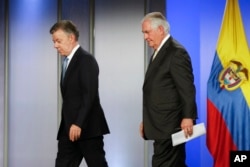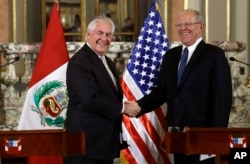The United States is rallying countries in the western hemisphere to escalate the fight against a problem that’s detrimental to the region: drug trafficking.
While encouraged by the progress made by Colombia in the reduction of coca growth, U.S. Secretary of State Rex Tillerson cautioned Tuesday that “results are what matter.”
“We need to see results, we need to see the trends reversing,” Tillerson said at a news conference in Bogota with Colombia President Juan Manuel Santos.
Tillerson’s remarks came days after U.S. President Donald Trump had threatened to curb assistance to illicit drug hotspots.
Last Friday, President Trump threatened to end aid to countries that fail to stop illegal drugs from pouring across the border, after a U.S. Customs and Border Protection official told him cocaine was primarily coming from Colombia and Peru, and trafficked through Mexico and Central America.
“There would be no supply of drugs if there’s no demand, and there would be no demand if there is no supply,” said Santos, indicating the demand in the U.S. is part of the problem.
“We have lost our best leaders, our best journalists, our best judges, our best policemen in this war against drugs,” said Santos, adding Colombia hoped to continue the cooperation with the U.S. to eradicate coca production.
Colombia receives large funding from the United States in the so-called Plan Colombia, which is the name of the U.S. foreign aid, military and diplomatic initiative aimed at combating Colombian drug cartels and left-wing insurgent groups.
The top U.S. diplomat also continued advocating for the maximum pressure campaign against North Korea in this hemisphere, a reminder of Pyongyang’s threats to the globe.
At the joint news conference in Bogota, Tillerson urged Colombia to join the international community to voice concerns over North Korea’s nuclear proliferation.
Earlier in Peru, Tillerson said Washington appreciates “the strong support that Peru has given the United States and the international community in pushing back on North Korea’s nuclear weapons program.”
“The recent sending home of diplomats from Peru is a very strong signal of Peru’s position,” said Tillerson at a news conference in Lima with Peruvian President Pedro Pablo Kuczynski.
“The rapid increase of cocoa cultivation, in many respects, was an unintended consequence of the peace that was negotiated with the FARC,” said Tillerson, referring to Colombia's largest rebel group, the Revolutionary Armed Forces of Colombia.
A peace deal signed by the Colombian government and the leftist FARC rebels in 2016 to end decades of war committed the guerrillas to stop the narcotics business and help farmers to switch to legal crops. But the cash benefits through that peace accord also brought farmers the incentives to fill their land with large amounts of illegal crops.
After Colombia, Tillerson heads to Kingston, Jamaica, the final stop on his five-nation Latin American tour.






